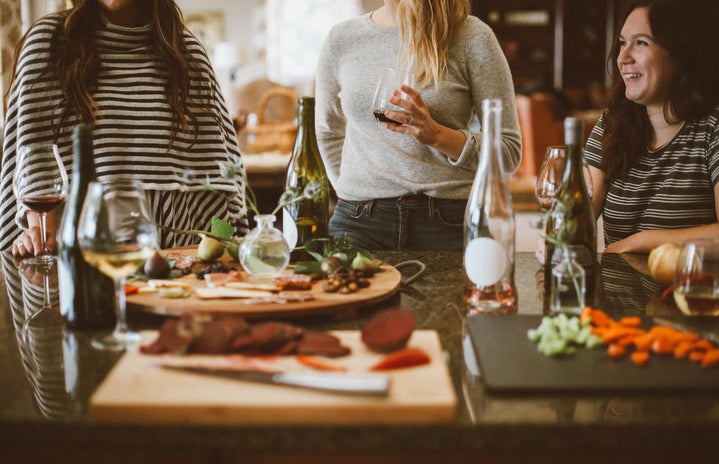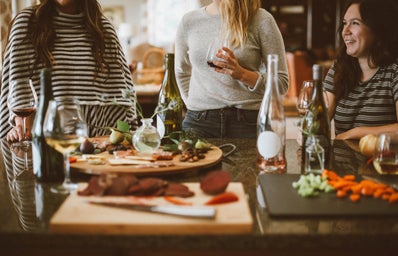Brisk winds blow as the sun shines through falling leaves on November 7th, 2020. The coronavirus pandemic is a recent and painful memory but has been quieted by the institution of an effective vaccine, allowing offices to fill, schools to reopen, and crowds to gather again. There’s a palpable feeling of gratitude in the air, as patrons walk closely past one another, unencumbered by masks and gloves, making pleasant eye contact and exchanging smiles as they go. The Village Market, a family-run grocer nearly forced to close during the virus scare, is bustling with shoppers. A Girl Scout troop stands at the entrance, their cookies stacked aplenty on a folding table nearby. Families ride bikes and walk dogs on the sidewalk out front. From the doors emerges a young woman, wearing what seems to be the town’s uniform – tight blue jeans, a cream-colored turtleneck sweater, and dark brown sunglasses perched on her head, holding her long hair back and fighting the blustery gusts of wind that threaten to remove them.
The cart is filled only with essentials: cheeses of every kind, red grapes and baguettes, chicken and blocks of tofu, colorful vegetables juxtaposed with bags of chocolate morsels, heads of lettuce next to bags of crinkle-cut potato chips. Bottles of sparkling cider and champagne clank together in the backseat as she drives away from the store with windows rolled down while fall classics from The Beatles and James Taylor ooze through the high-volume speakers. Once she pulls down the twisting driveway to her home, the purchases are put to use. Behind a flurry of chopped brussel sprouts, boiling pasta water, oven-baked cookies, and sauteed everything, emerges the beginnings of a proper feast. A long farm table is set with placements for twelve, reminiscent of da Vinci’s rendering of The Last Supper. Candles burn and soft music from a playlist entitled “Wine Night” bounces gently off the walls.
Today is not a holiday on the calendar. It doesn’t mark Jesus’s birth or his death, nor is its importance outlined in the Quran or mentioned in the stories of the Torah. The mandatory dress code is casual. The participants don’t plan to say grace. Tonight’s dinner is simply a celebration of gathering… a long-awaited and grossly overdue convention of friends, who are ecstatic to sit shoulder-to-shoulder once again. Each guest trickles in at a different time, bearing dessert and adding spirited laughter to the mix. Hugs seem to last a lifetime, broken only to conjoin once again. There is gratitude in hugging, and laughing, and gathering around a cramped kitchen island to sample an open-air charcuterie board. Formerly forbidden, everyone piously revels in these small activities, as if sacraments, once again.
From the back corner, pipes up a boisterous brunette with a story to tell about her family’s Passover-in-quarantine celebration. She can barely complete her tale of matzo-balls-turned-hockey-pucks before doubling over in a fit of laughter. “I was starving,” she says of the nightmarish soup, “I ended up eating an entire box of crackers for dinner.” Another friend, a gangly and tall man, with dusty blonde hair, commiserates from the sitting room. “You know what’s worse: when your dad burns lamb chops so badly the fire department needs to be called,” he yells, eliciting both gasps and cackles from the audience, “So much for a peaceful Easter at home… my mother nearly had a heart attack when she saw the police cruisers in the driveway after church. She’s thinking of maybe giving up my father’s cooking for Lent next year.”
This begets a lively conversation of “Would you rather?” inspired by this Lenten tradition. “Here’s a good one,” says the host as she pulls a sheet of roasted vegetables from the oven, “Would you rather give up all desserts or only eat desserts for the rest of your life?” This question prompts debate, and a list of pros and cons is quickly drawn up. Suddenly, another friend, a college-student fresh out of a class on the religion of Islam, pipes up, “Here’s the thing guys! Some people literally give up all food for a month… that’s Ramadan. So the real question is, would you rather fast for an extended period of time or be forced to eat strictly your least favorite food forever?” A roaring discourse ensues.
Dishes fill the table, end to end, making quite the amalgamation of crowd favorites. For the vegans, there’s grilled tofu and plenty of vegetables. A snide comment from a carnivorous young man in the corner sparks a heated discussion about the ethics and impacts of animal agriculture before the meal has even begun. The bowl of mashed potatoes is nearly emptied after its first trip around the table. The bread basket is drained within seconds. Forks and knives screech and tap against stark white plates filled with a remarkably bright color scheme. Amidst the chaos, the host proposes a toast, “To friends, to food, to all of us being under one roof for the first time in a long time, I am so thankful for each of you. Cheers.” While some audibly “aw,” the girl to her left yells, “She’s getting sappy on us!” before shouting, “Let’s eat!”
The guests laugh and toast and eat and serve each other. They tell stories of their college lives and reminisce about trials and tribulations of their shared high school experience – the teachers that nearly flunked them, the smell of the cafeteria on Thursdays, and the long-disputed senior superlative, “Most Likely to Succeed.” They don’t skirt around politics or religion or the lastest Hollywood gossip or climate change or how we may face a resurgence of a lethal virus. They share fears and hopes and goals and knock-knock jokes. When the food chills and darkness fills the window panes, they begin to say goodbye one by one. “This was much better than a Zoom,” says one of them. Thankful, well-fed, and socially rejuvenated, they offer hugs and secret handshakes as they depart, promising to gather again very soon. “Next time at my house!” says another.
As the host clears the plates and wipes the counters, she feels completely fulfilled in her mind, her soul, and certainly her stomach. The meal was nondenominational. There was no prayer, no specified menu, no sacred rituals… nothing like that. But there was friendship and joy, love and celebration, inspiration and community. Inside a home, not a church or a temple or a mosque, there was a visceral feeling of holiness. Somehow the tofu became sacred and their cups runneth over without making a mess in the kitchen. On this Saturday, the 4 o’clock service was replaced by good food, great friends, and a restored sense of faith, all borne from a dinner party.


